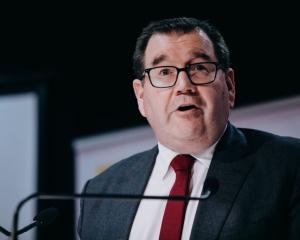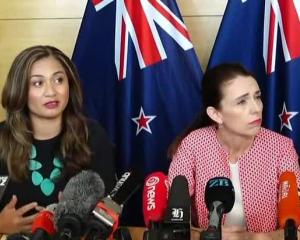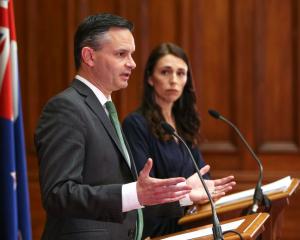With election day just nine days away, minor party leaders are in the spotlight in the multi-party debate tonight.
TVNZ's debate features NZ First leader Winston Peters, Green Party co-leader James Shaw, Act Party leader David Seymour, Advance NZ co-leader Jami-Lee Ross and Māori Party co-leader John Tamihere.
Green Party co-leader James Shaw began the introductory statements saying the Covid-19 response should include a focus on combating climate change.
He said if the Greens did not get in, one party would have all the power.
"The planet is running out of time. Think ahead. Party vote Green."
Māori Party co-leader John Tamihere said Labour's Māori MPs would get in on the list, so he encouraged people to give their electorate vote to the Māori Party.
MMP stands for More Māori in Parliament, he quipped.
NZ First leader Winston Peters gave his usual stump speech about his party being an "insurance" vote, keeping bigger parties in check.
In his pitch, Advance NZ co-leader Jami-Lee Ross said Parliament needed an independent new voice.
On tonight's poll results
The parties were asked about tonight's Colmar Brunton poll, which has only the Greens and Act above the 5 per cent threshold of the parties represented in tonight's debate.
Shaw was asked whether he should have sought a deal with Labour in Auckland Central, given the Greens' position on 6 per cent.
He said the Greens wanted to win the seat on their own merits.
Māori Party co-leader John Tamihere confirmed that his party would only form a coalition with Labour. National was off the table.
When asked why he was losing (on 2 per cent), Peters offered his usual contempt for polls. The party was in great shape, he said.
"It is people out there who will decide the election, not the polls."
Ross was asked about the fraud charges against him and whether that should disqualify him from getting back into Parliament.
He said he was a whistleblower and blew the lid on dodgy dealings within the National Party.
There was a slightly humorous moment when Mutch-McKay suggested that Ross and Peters had something in common because of their parties' current dealings with the Serious Fraud Office.
The camera panned to Peters, who was not impressed with that comparison.
On Covid-19
Seymour said NZ was an island nation with a young population and had some natural advantages in combating Covid-19.
New Zealand needed to get "Taiwan-smart" so it could maintain elimination without lockdowns, he said.
Was he comfortable with the privacy issues raised by a Covid Card? Absolutely, he said. All of the data could be anonymised.
Shaw rejected Seymour's claim that New Zealand did not "go hard and early". It had very few cases when it went into lockdown, he said.
Shaw said he found it extraordinary that the libertarian Act Party would support the Covid Card given the privacy issues it raised.
Ross was asked about his anti-lockdown rally with thousands of people and whether it was responsible given the restrictions at the time.
He stood by the rally, saying lockdowns would do more damage than the virus. He said they would lead to job losses and suicides.
Shaw jumped in, and said the suicide rate had actually fallen.
"You should not believe everything you read on the internet."
The leaders were asked whether they would get the Covid-19 vaccine once it was available.
Shaw, Tamihere, and Peters said yes. Seymour said yes - if he knew it was safe. Ross said he would not take a "rushed" vaccine.
None of the leaders wanted the vaccine to be mandatory.
On the recovery
The leaders are now being asked about their exciting new ideas to get New Zealand going again.
Shaw said every dollar of the stimulus spend should go towards long-term challenges like infrastructure.
Seymour said there was no silver bullet for economic development, but he would cut GST for a year, to encourage companies to hire people.
Tamihere said he was not interested in innovative ideas because Māori could not participate in the economy. He wanted Māori children educated the same as in Decile 9 and 10 schools, he said.
Seymour was asked about cutting benefit levels and other measures which would penalise low-income families.
He said he was simply taking benefit levels back to what they were under Labour at the beginning of the year.
On superannuation, climate change
The leaders were asked briefly about superannuation and climate change.
Peters raised concerns about immigrants being able to go on NZ Super after living in New Zealand for 10 years.
On climate change, Shaw said New Zealand needed to reduce emissions more quickly, and that a low-emissions economy was a high-wage economy.
On housing
Mutch McKay asked: "Would you introduce a policy which would bring prices down?"
Peters said prices have to be stabilised first. New Zealand needed to increase housing supply, starting with an inquiry into housing construction.
Tamihere wants to curb immigration to reduce demand for housing.
"Better late than never," Peters said, approving of his immigration stance.
Ross said New Zealand needed to rip up the RMA, flood the market with supply, and bring in a shared equity scheme.
Seymour said it was too hard to build homes. He takes too long to list his ideas, and gets cut off.
Shaw wants more state houses. Greens could build 5000 a year, he said.
Quickfire questions
Should private schools get Government money?
Shaw and Tamihere are against it.
"Our Government says no," says Shaw, making absolutely no reference to a certain school in Taranaki.
Peters, Seymour and Ross say yes.
Should we have quotas for Māori and Pacific students for medical school?
Shaw and Tamihere say yes.
Tamihere notes that once Māori get into med school, their failure rate is very low.
Peters says no, calls it tokenism.
"Stop putting Māori down. Teach them properly," he says.
On New Zealand's relationship with China
Ross says New Zealand needs to call China out more - says it was slow to criticise it over Covid-19.
Peters says as foreign minister, he had called out China on its detention camps and offshore island-building.
Should New Zealand become a republic and cut ties with the Queen?
Tamihere says yes.
"God bless the Queen and all that stuff."
Seymour says it's not a priority right now.
Peters says New Zealand needs the Commonweath on its side.
The leaders are asked which parties they could work with.
Ross doesn't give a clear answer. Neither does Peters.
Seymour says he could work with National but not Labour, saying there was a "skills shortage" within Labour's caucus.
Should the 5 per cent election threshold be lowered?
Peters says no.
Shaw wants 4 per cent - as suggested by the Electoral Commission in a 2012 review.













